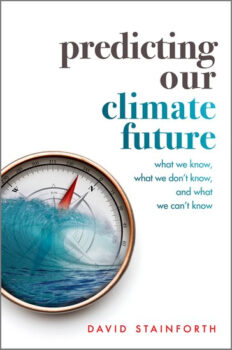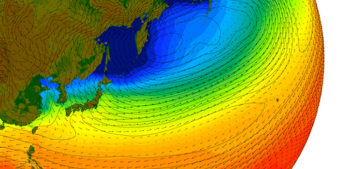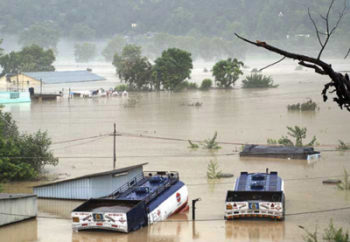David Stainforth

Background
David is a physicist by training and has many years’ experience of climate modelling.
While a researcher at Oxford University, he co-founded and was chief scientist of the climateprediction.net project, the world’s largest climate modelling experiment.
David has been both a NERC Research Fellow and a Tyndall Research Fellow at Oxford University.
Research interests
- How we can extract robust and useful information about future climate, and climate related phenomena, from modelling experiments;
- Issues of how to design climate modelling experiments and how to link climate science to real-world decision making in such a way as to be of value to industry, policymakers and wider society.
Research
Research - 2025
In this magazine essay David Stainforth says that the complexity of climate makes it impossible to provide accurate modeling. Read more

The authors of this paper use a low-dimensional system with key characteristics of a climate model, they examine two types of parametric uncertainty through a large ensemble approach. Read more

Utilising a low-dimensional system with key characteristics of a climate model, the authors of this paper examine two types of parametric uncertainty through a large ensemble approach. Read more

Research - 2024
The authors of this paper summarise the contributions to the Topical Collection on quality of climate information for adaptation decision support. Read more

The authors of this article propose an extension of Hasselmann’s stochastic energy balance model. Read more

Research - 2023
The authors of this paper provide a framework that can be used to assess and compare different CDR strategies quantitatively to help guide future research, development, and policy efforts. Read more

This book is about how climate science works and why you should absolutely trust some of its conclusions and absolutely... Read more

In this article, we approach the problem of measuring and interpreting the mid-term climate of a non-autonomous chaotic dynamical system... Read more

Research - 2022
The authors of this paper argue that these unquantified, poorly understood and often deeply uncertain risks from climate change can and should be included in economic evaluations and decision-making processes. Read more

The authors of this paper define a model selection parameter, which switches on one of a suite of proposed climate nonlinearities and multidecadal climate feedbacks. find that a model with a temperature-dependent climate feedback is most consistent with global mean surface temperature observations, but that the sign of the temperature-dependence is opposite of what Earth system models suggest. Read more

Research - 2021
Stainforth, David A. and Calel, Raphael (2021) The economics of global climate variability. US CLIVAR Variations, 20 (1). pp.... Read more

When do probability distribution functions (PDFs) about future climate misrepresent uncertainty? How can we recognise when such misrepresentation occurs and... Read more

The authors of this paper assess the quality of state-of-the-art regional climate information intended to support climate adaptation decision-making. They use the UK Climate Projections 2018 as an example of such information. Read more

To meet climate targets, technologies that remove atmospheric carbon dioxide will probably be needed. An analysis shows how their development... Read more

To meet climate targets, technologies that remove atmospheric carbon dioxide will probably be needed. An analysis shows how their development... Read more

Our complementary approach exploits the correspondence between Hasselmann’s EBM and the original mean-reverting stochastic model in physics, Langevin’s equation of 1908. We propose mapping a model well known in statistical mechanics, the Mori-Kubo Generalised Langevin Equation (GLE) to generalise the Hasselmann EBM. Read more

The authors of this paper construct an analytical framework for the quality assessment of science-based statements and estimates about future climate. Read more

Research - 2020
Climate science employs a hierarchy of models, trading the tractability of simplified energy balance models (EBMs) against the detail of... Read more

A number of influential assessments of the economic cost of climate change rely on just a small number of coupled... Read more

Climate science and climate economics are critical sources of expertise in our pursuit of the Sustainable Development Goals. Effective use... Read more

Research - 2019
Successful adaptation to climate change at regional scales can often depend on understanding the nature of geomorphological responses to climate... Read more

The frequency and severity of heatwaves is expected to increase as the global climate warms. We apply crossing theory for... Read more

Research - 2018
Article explores the local consequences of global climate change and the implications for decisions about how to adapt. Earth Magazine,... Read more

Abstract Knowledge about regional and local climate change can inform climate risk assessments and adaptation decisions. However, estimates of future... Read more

This research applies a Decision‐Making Under Uncertainty (DMUU) approach to explore the robustness of adaptation options and pathways against future climate and socioeconomic uncertainties in the Cauvery River Basin in Karnataka, India. Read more

Research - 2016
Integrated assessment models (IAMs) are the main tools for combining physical and economic analyses to develop and assess climate change... Read more

Abstract Climate change adaptation is unavoidable, particularly in developing countries where the adaptation deficit is often larger than in developed... Read more

Research - 2015
The quantification of uncertainty is an increasingly popular topic, with clear importance for climate change policy. However, uncertainty assessments are... Read more

We demonstrate how the fundamental timescales of anthropogenic climate change limit the identification of societally relevant aspects of changes in... Read more

Model simulations of the next few decades are widely used in assessments of climate change impacts and as guidance for... Read more

The United Kingdom Climate Impacts Programme’s UKCP09 project makes high-resolution projections of the climate out to 2100 by post-processing the... Read more

Abstract Society is vulnerable to extreme weather events and, by extension, to human impacts on future events. As climate changes... Read more

Research - 2014
Stainforth, D. A. In: Nature Climate Change (9th March 2014). Read more

We expose the benefits and limitations of the Bayesian Network approach, weather index insurance as an adaptation measure and climate simulations as a source of quantitative predictive information. Current climate model output is shown to be of limited value and difficult to use by index insurance practitioners. The method presented, however, is shown to be an effective tool for testing pricing assumptions and could feasibly be employed in the future to incorporate multiple sources of climate data. Read more

Research - 2013
Frigg, R., L.A. Smith, D. A. Stainforth. In: Philosophy of Science, December 2013. Read more

Abstract It has recently been highlighted that the economic value of climate change mitigation depends sensitively on the slim possibility... Read more

Abstract Climate change poses challenges for decision makers across society, not just in preparing for the climate of the future... Read more

Abstract Can today’s global climate model ensembles characterize the 21st century climate in their own ‘model-worlds’? This question is at... Read more

Abstract Climate sensitivity is commonly taken to refer to the equilibrium change in the annual mean global surface temperature following... Read more

Abstract Expert elicitation studies have become important barometers of scientific knowledge about future climate change (Morgan and Keith, Environ Sci... Read more

Research - 2010
Working Paper 23 Abstract The rationale for international agreements on climate change mitigation comes from the global scope of impacts,... Read more

Policy
Policy - 2019
Economic assessments of the potential future risks of climate change have been omitting or grossly underestimating many of the most serious consequences for lives and livelihoods because these risks are difficult to quantify precisely and lie outside of human experience. This policy insight identifies and draws attention to these 'missing risks' and discusses how populations might fare in light of their potential to adapt in the face of these risks. Read more

Policy - 2013
An Independent National Adaptation Programme for England Read more

Books
Books - 2023
This book is about how climate science works and why you should absolutely trust some of its conclusions and absolutely... Read more

Books - 2021
Our complementary approach exploits the correspondence between Hasselmann’s EBM and the original mean-reverting stochastic model in physics, Langevin’s equation of 1908. We propose mapping a model well known in statistical mechanics, the Mori-Kubo Generalised Langevin Equation (GLE) to generalise the Hasselmann EBM. Read more

Events
Events - 2026
Events - 2024
Climate Change: Economics and Governance – LSE Executive Education course
Event Type: LSE Executive Education CoursesClimate Change: Economics and Governance – LSE Executive Education course
Event Type: LSE Executive Education CoursesEvents - 2022
Events - 2020
Events - 2016
Events - 2015
News
News - 2023
In this BBC podcast David Stainforth discusses the unpredictability of the climate and whether we can and should try to... Read more

In this interview with the LSE Review of Books Blog David Stainforth discusses his new book, Predicting Our Climate Future: What We Know, What We Don’t Know, and What We Can’t Know. Read more

News - 2021
In this commentary piece David Stainforth explains how a novel model for emissions trading could prove to be an effective... Read more

News - 2018
BBC News, 26 November 2018 Read more

CNN, 26 November 2018 Read more

News - 2013
A translation of observations of weather into observations of climate change at local scales is presented in a new paper... Read more
David Stainforth discusses his climate change research paper, which shows how the distributions of daily temperatures have changed shape over the last half century. Such information is likely to be valuable in planning adaptation measures. Read more
Drs Joe Daron and David Stainforth use the video to further explain their paper, which suggests that to understand future climate we need far larger ensembles of Global Climate Models than are available today. Read more
Senior Research Fellow, David Stainforth, gave a presentation at EQUIP workshop (a NERC-funded project) on 13/14 March at the Royal... Read more
News - 2011
Grantham Research Institute on Climate Change and the Environment, London School of Economics. Online article no longer available. The Royal... Read more

This exhibit, from 5-10 July, aims to explore how predictions are made and communicated, how and when probabilities can be deduced, and the role of computer models in these processes. It will involve interactive computer-based probability games and hands-on physical games to do so. Dr David Stainforth is leading its preparation. Read more
News - 2010
Dave Stainforth: The recent scandals demonstrate a wide misunderstanding of climate science, and of science more generally the Guardian Read more


